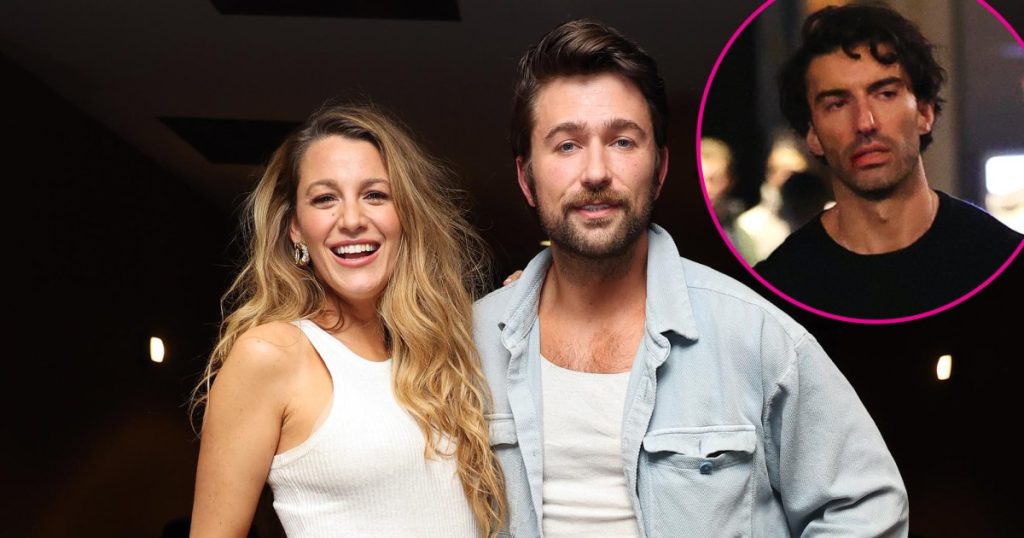The entertainment world was recently rocked by allegations of sexual harassment and reputation sabotage when actress Blake Lively filed a lawsuit against her “It Ends With Us” co-star, Justin Baldoni. The suit, filed in December 2023, accuses Baldoni of inappropriate behavior and launching a smear campaign aimed at damaging Lively’s career. Baldoni vehemently denies the accusations, labeling them as fabricated and sensationalized. The fallout from the lawsuit has been swift and significant, with Baldoni being dropped by his talent agency. Amidst this controversy, Lively has found a vocal supporter in another “It Ends With Us” co-star, Brandon Sklenar.
Sklenar publicly expressed his support for Lively by sharing a link to the New York Times article detailing the allegations, urging his followers to read the piece. He accompanied the post with a heart emoji and tagged Lively, clearly demonstrating his solidarity. This public display of support underscores the complex relationships and dynamics that can exist within a film production, particularly one dealing with sensitive subject matter like “It Ends With Us,” which explores themes of domestic violence and complex relationships. Sklenar’s support for Lively occurred shortly after he was seen celebrating the holidays with a group of friends, including Miles Teller, Keleigh Teller, and Chace Crawford, further highlighting the interconnectedness of their social circle, which also includes Lively and Taylor Swift.
The bond between Lively and Sklenar appears to have been forged during the filming of “It Ends With Us.” In the movie, Lively portrays Lily, a woman escaping an abusive relationship with Ryle, played by Baldoni. Sklenar plays Atlas, Lily’s old flame who helps her navigate her escape. Notably, during the film’s promotional tour, Lively and Sklenar conducted press interviews together, while Baldoni appeared solo. This arrangement, in retrospect, seems to foreshadow the underlying tensions that have now erupted into public view. It’s significant to note that Sklenar has previously stepped up to defend Lively against public criticism.
Earlier in the year, when Lively faced backlash for allegedly downplaying the film’s domestic violence themes, Sklenar was the first among her co-stars to speak out in her defense. He emphasized the cast’s dedication to portraying a message of hope and empowerment for women, highlighting the importance of not vilifying the actors who poured their hearts into the project. He voiced his disappointment with the online negativity surrounding the film and reiterated the cast’s awareness of the responsibility they held in depicting such a sensitive topic. Sklenar’s consistent support for Lively paints a picture of allyship and solidarity.
Sklenar’s August statement emphasized the intention behind the film, stressing the importance of men taking accountability for their actions and behavior. He argued that the online negativity surrounding the film’s portrayal of domestic abuse was counterproductive and detracted from the film’s intended message. This message resonated with many who felt that the criticism leveled against Lively was misplaced. His statement highlighted the delicate balance between artistic expression and societal responsibility, especially when tackling sensitive subject matter like domestic violence.
The ongoing legal battle between Lively and Baldoni, coupled with Sklenar’s public support for Lively, further complicates the narrative surrounding “It Ends With Us.” It brings to light the potential for discord and conflict behind the scenes of a film production, especially when dealing with themes as challenging as domestic abuse. The situation underscores the importance of fostering a safe and respectful working environment in the entertainment industry and highlights the need for addressing and resolving allegations of misconduct seriously. As the legal proceedings unfold, the future of “It Ends With Us” and its associated parties remains uncertain. Only time will tell how these allegations will impact the careers of those involved and the reception of the film itself. The situation remains a complex and evolving story with significant implications for the entertainment industry and the broader conversation about accountability and workplace conduct.

